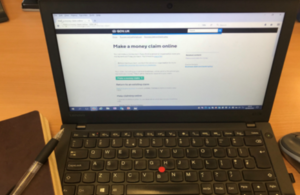Quicker way to resolve claim disputes launched online
A new online service to make it quicker and easier for people to claim money owed, resolve disputes out of court and access mediation has gone live.

The new service, introduced by HM Courts & Tribunals Service (HMCTS), can be used to start a claim against anyone in England and Wales, and provides a quicker, more user-friendly way to start an action in the County Court for amounts up to £10,000.
Rather than having to fill in and post a paper form, or use an outdated online system from 2002, the new pilot allows people to issue their County Court claim more easily, settle the dispute online and recommends mediation services – which can save time, stress, and money.
More than 1,400 people have already used an earlier pilot of the system launched in August last year. Over 80% of those early users, including individuals and small businesses, found the service very good and easy to use. Early evidence suggests that the online system has improved access to justice as engagement from defendants has improved.
Launching the new service, Justice Minister Lucy Fraser said:
We know that using the civil courts has been a daunting prospect for some. This innovative, quick and easy online system will enable people and small businesses to get back the money that is rightly owed to them.
This is an excellent example of the work we are doing under our £1billion plan to transform the courts system, allowing people to access justice online and around their busy lives.
Justice Birss, who chairs the sub-committee of the Civil Procedure Rules Committee dealing with this Civil Money Claims pilot scheme, said:
This is an important step in the modernisation of our courts and tribunals system.
For too long the perceived delays and complexity of the system have put off too many people from using the civil courts to make a small claim. When it is complete this new online route will give members of the public and small businesses a more user-friendly way to access justice. The system now being made available to the public is the first stage in that new route.
Lizzie Iron, head of service at the Personal Support Unit, a charity supporting people who represent themselves in the civil and family justice system, said:
“The PSU welcomes the new online system: It avoids most of the formal legal language of traditional court processes, and is much more intuitive for users. While traditional processes are still the norm, this is a clear step forward for people who are comfortable with online processes. It reflects the commitment of HMCTS to designing an improved range of services tailored to the different needs of all court-users.”
The initiative is an important first step in the modernisation of the civil justice system and begins to deliver the vision set out by Lord Briggs in his 2016 report on the structure of civil courts, where he called for claims worth up to £25,000 to be solved in an online court. It is launched after a year of development with members of the judiciary, representatives from the advice and legal community and users, and will continue to be piloted while other aspects of an end-to-end online system are developed.
The move is part of the Government’s £1 billion investment to modernise the court service, making it swifter, simpler, and easier to access for everyone. HMCTS is exploring how justice can best be served in the digital age.
Other examples of the Government’s court reforms which are making access to justice easier for everyone include:
- A new service which allows people to submit their tax appeals online – drastically cutting the number of applications being returned as incomplete or inaccurate
- Launching the first divorce application services online - making the process easier to understand for divorce applicants and helping to progress applications
- A new paperless system, in operation at Lavender Hill Magistrates’ Court, which means thousands of cases involving fare evasion are processed more swiftly and effectively.